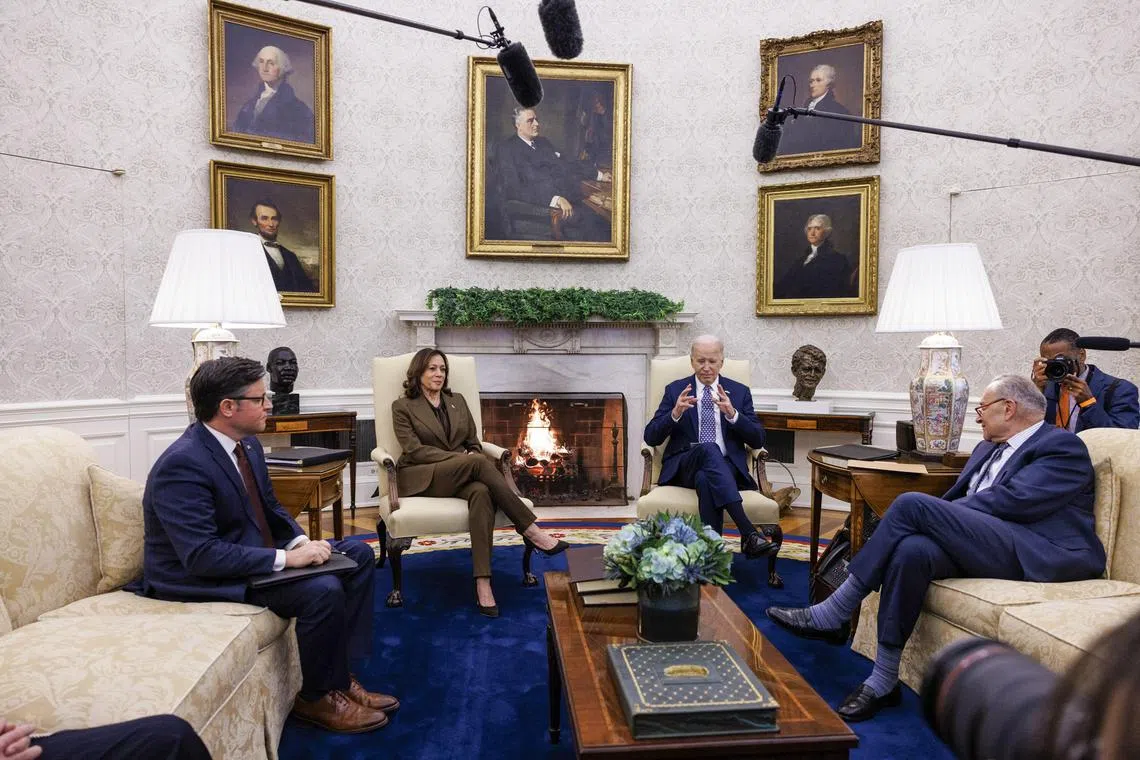Biden warns of 'dire' Ukraine fate in high-stakes White House talks
Sign up now: Get ST's newsletters delivered to your inbox

House Speaker Mike Johnson (far left), a Donald Trump ally who leads a razor-thin Republican majority, has refused to allow a vote on the so-called supplemental funding Bill, which includes aid for Ukraine.
PHOTO: NYTIMES
Follow topic:
WASHINGTON - US President Joe Biden warned top congressional leaders on Feb 27 of the dire cost of failing to give Ukraine military aid as he hosted high-stakes talks at the White House.
The rare Oval Office meeting escalated efforts to unlock billions of dollars of stalled assistance for Ukraine’s fight against Russia’s invasion – and to avert a government shutdown at home.
“On Ukraine, I think the need is urgent,” said Mr Biden, flanked by Vice-President Kamala Harris, adding that the “consequence of inaction every day in Ukraine is dire.”
House Speaker Mike Johnson, a Donald Trump ally who leads a razor-thin Republican majority, has refused to allow a vote on a so-called supplemental funding Bill
Mr Biden met Mr Johnson and his Democratic counterpart Hakeem Jeffries, as well as the Senate’s Democratic Majority Leader Chuck Schumer and opposition chief Mitch McConnell.
The showdown comes after President Volodymyr Zelensky warned that Ukraine desperately needs continued support from the West to defeat Russia’s invasion, and voiced hope the United States would approve the stalled package that includes US$60 billion (S$80 billion) of weapons and other aid.
Moscow is currently mounting heavy attacks on Ukrainian troops, who are struggling with an ammunition shortage as sceptical Republicans in the House of Representatives block aid.
Trump, Mr Biden’s likely rival in November’s presidential election, is pressuring his party to deny further Ukraine funding until the United States has addressed his own top campaign issue – a surge in illegal immigration at the US-Mexican border.
Many Republicans, though, are believed to want to back Ukraine’s fight.
“There is a strong bipartisan majority in the House standing ready to pass this Bill if it comes to the floor,” Mr Biden’s national security adviser, Mr Jake Sullivan, told CNN.
“And that decision rests on the shoulders of one person – and history is watching whether Speaker Johnson will put that Bill on the floor.”
‘Act now’
When Russia launched its full-scale invasion of Ukraine in February 2022, US lawmakers were overwhelmingly in favour of arming the pro-Western former Soviet republic, which denuclearised in the 1990s after gaining assurances from the West over its security.
The Senate has remained largely supportive and recently passed a package pairing the Ukraine funding with help for Israel’s military and for democratic Taiwan. But this then died in the House.
“Now is the time for action. Speaker Johnson cannot let politics or blind obeisance to Donald Trump get in the way,” Mr Schumer, who led a trip to western Ukraine last week, said in a letter to colleagues.
Treasury Secretary Janet Yellen also called on Feb 27 for Congress to green light the aid.
The House “must act now” to help Ukraine and “to protect our national security interests and the values we and our allies and partners all share,” she told a press conference, ahead of a meeting of the Group of 20 finance ministers in Sao Paulo, Brazil.
The White House meeting will also address a partial government shutdown looming on March 1, as Congress still has not approved the 12 annual spending Bills that make up the federal budget, almost five months into the 2024 fiscal year.
Without a resolution, a full government shutdown would come on March 8 – a day after Mr Biden’s annual State of the Union address.
The two sides have been negotiating daily and had hoped to release the text on Feb 25 for the first four spending Bills covering about a quarter of the budget, including agriculture, veterans, transport and housing. AFP

